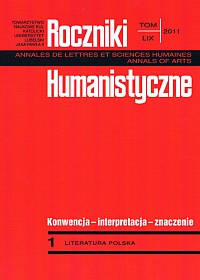The Day of Wrath, the Day of Mercy. Books of the Old Testament in Roman Brandstaetter's Dzień gniewu (The Day of Wrath)
Abstract
In Roman Brandstaetter's drama The Day of Wrath motifs may be found that are taken from the Books of the Prophets and the Wisdom Books of the Old Testament. They allow looking at the title day of wrath as the time, in which God's action is manifested. Like in the message by the prophet Zephaniah, in the drama destruction and salvation may be a revelation of God as the Lord of history and the Savior. Recollecting the words of prophets, psalms, the Gospel and the Apocalypse in the drama allows looking at the 20th century events as a subsequent realization of God's promises. The events in the drama are a kind of repetition and continuation of biblical scenes. Passion and salvation given by God during the banishment become present. God's action is confronted with the man's faith that has been weakened. The protagonists of the drama experience “the time of wrath, the time of mercy”, in which their conversion may at last happen. Owing to the words of the Holy Scriptures intertwined in the text of the drama the image of God's awesomeness and of the surrounding evil do not become a source of despair for the protagonists, but allow them to accept God's incomprehensible will.
Copyright (c) 2011 Roczniki Humanistyczne

This work is licensed under a Creative Commons Attribution-NonCommercial-NoDerivatives 4.0 International License.





